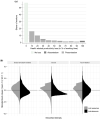Who gains the most from improving working conditions? Health-related absenteeism and presenteeism due to stress at work
- PMID: 31309366
- PMCID: PMC6803571
- DOI: 10.1007/s10198-019-01084-9
Who gains the most from improving working conditions? Health-related absenteeism and presenteeism due to stress at work
Abstract
Work stress-related productivity losses represent a substantial economic burden. In this study, we estimate the effects of social and task-related stressors and resources at work on health-related productivity losses caused by absenteeism and presenteeism. We also explore the interaction effects between job stressors, job resources and personal resources and estimate the costs of work stress. Work stress is defined as exposure to an unfavorable combination of high job stressors and low job resources. The study is based on a repeated survey assessing work productivity and workplace characteristics among Swiss employees. We use a representative cross-sectional data set and a longitudinal data set and apply both OLS and fixed effects models. We find that an increase in task-related and social job stressors increases health-related productivity losses, whereas an increase in social job resources and personal resources (measured by occupational self-efficacy) reduces these losses. Moreover, we find that job stressors have a stronger effect on health-related productivity losses for employees lacking personal and job resources, and that employees with high levels of job stressors and low personal resources will profit the most from an increase in job resources. Productivity losses due to absenteeism and presenteeism attributable to work stress are estimated at 195 Swiss francs per person and month. Our study has implications for interventions aiming to reduce health absenteeism and presenteeism.
Keywords: Absenteeism; Health-related productivity losses; Presenteeism; Self-efficacy; Task-related and social stressors and resources at work.
Figures



References
-
- Schultz AB, Edington DW. Employee health and presenteeism: a systematic review. J. Occup. Rehabil. 2007;17(3):547–579. - PubMed
-
- Parent-Thirion A, et al. Eurofound, Sixth European Working Conditions Survey—Overview Report (2017 update) Luxembourg: J Publications Office of the European Union; 2017.
-
- Caverley N, Cunningham JB, MacGregor JN. Sickness presenteeism, sickness absenteeism, and health following restructuring in a public service organization. J. Manag. Stud. 2007;44(2):304–319.
-
- Demerouti E, et al. Present but sick: a three-wave study on job demands, presenteeism and burnout. Career Dev. Int. 2009;14(1):50–68.
-
- Karasek RA., Jr Job demands, job decision latitude, and mental strain: Implications for job redesign. Admin. Sci. Q. 1979;24:285–308.
MeSH terms
LinkOut - more resources
Full Text Sources
Medical

